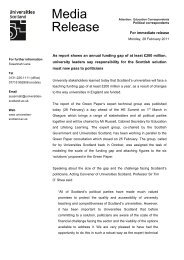Prosperity Scotland 2006.pdf - Universities Scotland
Prosperity Scotland 2006.pdf - Universities Scotland
Prosperity Scotland 2006.pdf - Universities Scotland
- No tags were found...
You also want an ePaper? Increase the reach of your titles
YUMPU automatically turns print PDFs into web optimized ePapers that Google loves.
Hub and clusterA significant amount of economic theory points to the presence of ‘spatial agglomerations’ or industry clusters as beingan important factor determining which regions experience higher growth. It is generally accepted in economic geographyliterature that many industrial clusters exist because they facilitate localised knowledge creation across groups ofbusinesses. That is, the co-location of related or similar economic activities is beneficial, for example through spilloversof technology and knowledge and through common pools of labour, infrastructure or specialised business services.The clustering of inputs such as industrial and university research and development, groups of manufacturing firms inrelated industries and networks of business-service providers can potentially create scale economies in the creationof knowledge, and facilitate the transfer of knowledge to other firms in the area. Clusters are particularly important inknowledge based sectors where competitive advantage often requires proximity or regular face-to-face interactions.<strong>Universities</strong> have an important role in generating and sustaining business clusters. All cluster models include as primarydrivers of economic growth education, human capital and research and development. Higher education is involved in theproduction of all of these in <strong>Scotland</strong>. ‘Location’ economies arise from the scale or concentration of universities within aregion and ‘urbanisation’ economies where external firms benefit from information spillovers from the universities. Wecan describe some of the agglomeration economies which might be associated with universities:••••Enterprises are likely to cluster together with other related industries. As the major supplier and trainer ofskilled labour in a region, universities can clearly be seen as part of the upstream and downstream linkages of‘local clusters’.‘Urbanisation’ economies can be strongly associated with universities in <strong>Scotland</strong>. Financial services, musicand sectors with rapid turnaround such as design are believed to be strongly associated with universities inmetropolitan areasThe area around a large, successful university can be thought of as a ‘technoburb’ with almost invisible positiveexternalities which link the local industry cluster and the institution in a tight web of transactions of thought andmethod.Although the key role for universities is often sustaining clusters, studies in the US highlight examples whereclusters are a result of university initiatives (Silicon Valley, Route 128 and North Carolina’s Research Triangle).One report 8 emphasises the role of universities in creating and sustaining clusters and uses <strong>Scotland</strong> as an exampleof how this works. Clusters linked to universities are likely to be sustained in the long term because of the long-termcommitment of the university. <strong>Universities</strong> are often closely associated with the emergence of new industries that haveno technological antecedent in the region. This means that universities have an important role to play in developingnew industries which provide long-term employment and wealth in a region. This report cites the emergence of optoelectronicsin <strong>Scotland</strong>’s central belt as a classic example of this type of regional innovation.<strong>Scotland</strong> does not have a particularly innovation-rich economy. In this context, economists believe that universities canplay the role of a large high-innovation firm and configure the innovation environment around its spin-out companies byworking directly with other (primarily) small and medium enterprises in the following manner:•••••Research and development partnerships with other firmsEncouraging local suppliers to be more innovativeActing as knowledge-intensive business services and thus helping to build up levels of expertise.Building new networks and benefiting from cluster effectsSecond generation spin-outs can resultFinally, there is a growing body of economic theory which emphasises the economic effect of ‘externalities’ from highereducation. These are social impacts which create conditions for economic growth, such as:•••Improved appreciation of culture and cultural diversity.Improved ability to participate in political process.Better able to fully function as a member of society• Improved healthPage





